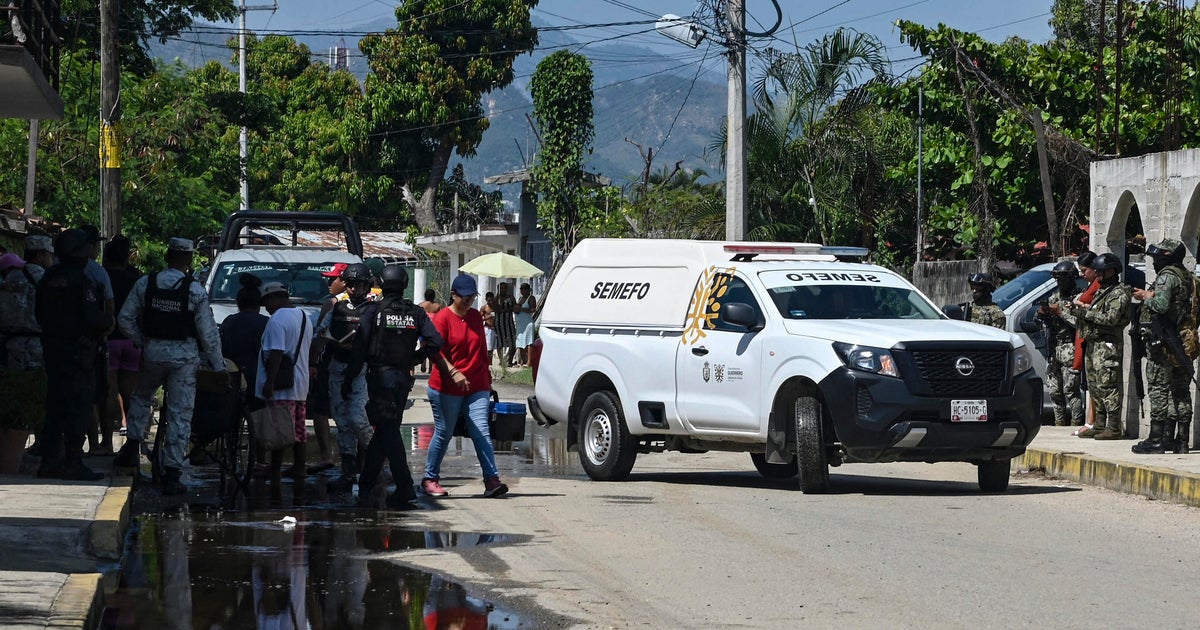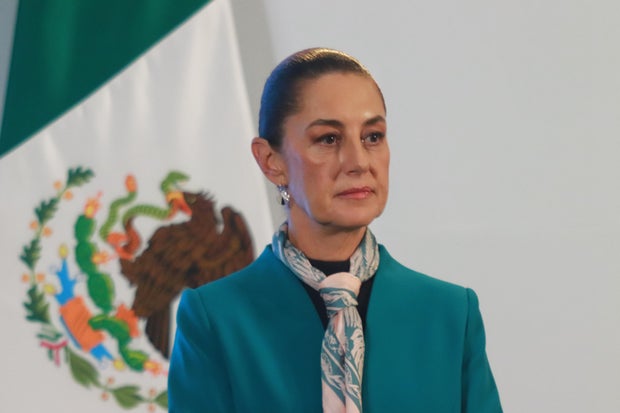CBS News
Bodies of 11 people, including 2 children, found dumped by highway in Mexico weeks after city’s mayor decapitated

Police in a southern Mexico region rife with drug cartel violence have found 11 bodies, including two of minors, dumped by a highway, prosecutors in the state of Guerrero said Thursday.
The bodies were found late Wednesday after police received a tip about an abandoned pickup truck on the main thoroughfare of the city of Chilpancingo, the state capital, prosecutors said in a news release. The city of 300,000 has been the scene of gruesome drug gang violence as two rival cartels fight for control of the area.
Prosecutors did not specify the ages of the two dead minors but said that two of the 11 bodies were female. The highway where they were found is also the main route between Mexico City and the resort of Acapulco.
In early October, the city’s mayor was killed and beheaded just a week after he took office. Alejandro Arcos took office on Oct. 1 in Chilpancingo, and his beheaded body was found in a pickup truck a week later, his head placed on the vehicle’s roof. Days later, four mayors asked federal authorities for protection.
Arcos’ murder came days after the killing of another city official, Francisco Tapia, according to Institutional Revolutionary Party president Alejandro Moreno.
“They had been in office for less than a week. Young and honest officials who sought progress for their community,” Moreno said on X.
Two rival drug gangs, known as the Tlacos and the Ardillos, are fighting for control of the drug and extortion business in the city.
In 2023, gang violence in Chilpancingo became so brazen that one of the gangs staged a demonstration of hundreds of people, hijacked a government armored car, blocked a major highway and took police hostage to win the release of arrested suspects.
On Monday, officials said gunmen killed five members of the same family in a house in a suburb of Acapulco, which is in the state of Guerrero.
FRANCISCO ROBLES/AFP via Getty Images
Violence in Guerrero reached such unprecedented levels that earlier this year, Roman Catholic bishops announced they had helped arrange a truce in another part of the state between two warring drug cartels.
At the time, former president Andrés Manuel López Obrador- who refused to confront the gangs – said he approved such talks.
“Priests and pastors and members of all the churches have participated, helped in pacifying the country. I think it is very good,” said López Obrador, who left office Sept. 30.
Mexico appears to abandon “hugs, not bullets” strategy
For the last six years, Mexico bragged about its oft-questioned “hugs, not bullets” strategy, in which its leaders avoided confrontations with drug cartels that were gradually taking control of large parts of the country. The thinking was that social programs, not shootouts, would gradually drain the pool of cartel gunmen.
Now, a month into the term of new President Claudia Sheinbaum, a string of bloody confrontations suggests the government is quietly abandoning the “no bullets” part of that strategy and is much more willing to use the full force of the military and the militarized National Guard.
But the challenge Mexico now faces is different from that during the country’s 2006-2012 drug war. Cartels today are more diversified, more deeply entrenched in migrant smuggling and more willing to use foreign recruits and adolescents to fill their ranks.
All of that has led to a string of violent clashes in which security forces who shoot at suspected drug cartel convoys wind up killing bystanders and migrants, and reporting lopsided death tolls in which soldiers aren’t harmed but most of the suspects are wiped out.
Sheinbaum has studiously avoided using the “hugs, not bullets” slogan popularized by her predecessor and mentor, López Obrador. She has, after all, pledged to continue each and every one of López Obrador’s policies. Her office did not respond to a request for comment.
Carlos Santiago/ Pixelnews/Future Publishing via Getty Images
But Sheinbaum has had to perform some verbal gymnastics to avoid disowning the policy entirely.
“Clearly, it isn’t a question of hugs for criminals, nobody has ever said that,” Sheinbaum said soon after taking office. The hugs, she said, were meant for impoverished youths, to avoid having them recruited as cartel gunmen.
“There are traces of a change in tone toward organized crime, but it’s too early to call,” said Falko Ernst, a security analyst. “It seems unlikely that the Sheinbaum administration would risk a politically inconvenient, steady stream of violent imagery by betting on wholesale balazos (bullets)-only strategy,” but there may be more willingness to confront “the most overt and brazen displays of power” by the cartels.
CBS News
Canada shuts down TikTok’s Canadian offices, but allows app to remain

Canada announced Wednesday it won’t block access to the popular video-sharing app TikTok but is ordering the dissolution of its Canadian business after a national security review of the Chinese company behind it.
Industry Minister François-Philippe Champagne said it is meant to address risks related to ByteDance Ltd.’s establishment of TikTok Technology Canada Inc.
“The government is not blocking Canadians’ access to the TikTok application or their ability to create content. The decision to use a social media application or platform is a personal choice,” Champagne said.
Champagne said it is important for Canadians to adopt good cybersecurity practices, including protecting their personal information.
He said the dissolution order was made in accordance with the Investment Canada Act, which allows for the review of foreign investments that may harm Canada’s national security. He said the decision was based on information and evidence collected over the course of the review and on the advice of Canada’s security and intelligence community and other government partners.
A TikTok spokesperson said in a statement that the shutdown of its Canadian offices will mean the loss of hundreds of local jobs.
“We will challenge this order in court,” the spokesperson said. “The TikTok platform will remain available for creators to find an audience, explore new interests and for businesses to thrive.”
TikTok is wildly popular with young people, but its Chinese ownership has raised fears that Beijing could use it to collect data on Western users or push pro-China narratives and misinformation. TikTok is owned by ByteDance, a Chinese company that moved its headquarters to Singapore in 2020.
TikTok faces intensifying scrutiny from Europe and America over security and data privacy. It comes as China and the West are locked in a wider tug of war over technology ranging from spy balloons to computer chips.
Canada previously banned TikTok from all government-issued mobile devices. TikTok has two offices in Canada, one in Toronto and one in Vancouver.
Michael Geist, Canada research chair in internet and e-commerce law at the University of Ottawa, said in a blog post that “banning the company rather than the app may actually make matters worse since the risks associated with the app will remain but the ability to hold the company accountable will be weakened.”
Canada’s move comes a day after the election in the United States of Donald Trump. In June, Trump joined TikTok, a platform he once tried to ban while in the White House. It has about 170 million users in the U.S.
Trump tried to ban TikTok through an executive order that said “the spread in the United States of mobile applications developed and owned” by Chinese companies was a national security threat. The courts blocked the action after TikTok sued.
Both the U.S. FBI and the Federal Communications Commission have warned that ByteDance could share user data such as browsing history, location and biometric identifiers with China’s government. TikTok said it has never done that and would not, if asked.
Trump said earlier this year that he still believes TikTok posed a national security risk, but was opposed to banning it.
U.S. President Joe Biden signed legislation in April that would force ByteDance to sell the app to a U.S. company within a year or face a national ban. It’s not clear whether that law will survive a legal challenge filed by TikTok or that ByteDance would agree to sell.
CBS News
Could prison companies get a boost from Trump’s immigration policies?

The Trump administration could be a boon for business for private prison companies in the U.S. if the president-elect delivers on his promise to crack down on illegal immigration.
CoreCivic and Geo Group, the two biggest private prison operators in the U.S., both contract with the U.S. Immigration and Customs Enforcement (ICE) to house detained, undocumented migrants. Their stocks soared Wednesday following Trump’s election win, with investors betting the companies will see increased profits from a tough-on-immigration administration.
CoreCivic, which closed at $13.50 a share on November 5, is trading at $22 a share, while Geo Group, which closed at $15 a share Tuesday, is currently trading at $23.75.
“Obviously, investors believe there is going to be a significant increase in opportunity for both of these firms under the Trump administration,” Noble Capital Markets analyst Joe Gomes told CBS MoneyWatch.
Geo Group executives acknowledged on the company’s third-quarter earnings call Thursday that it expects the incoming administration to enact stricter border security policies and that the company stands “ready to provide additional resources to help ICE meet future needs.”
CoreCivic executives also said they believe the election result will drive demand for its services.
ICE is biggest customer
During Trump’s first term in office, from 2017-2021, immigration detention expanded at record levels, according to an ACLU report. In 2019, ICE detained an average of over 50,000 people each day. At times, that number exceeded 56,000 — about 50% more than peak levels during the Obama administration, according to the report. During his first term in office, Trump expanded the federal government’s use of private prison companies to detain immigrants.
As of January 2020, 81% of people detained in ICE custody across the U.S. were held in facilities owned or managed by private prison corporations, according to the ACLU report.
In his second term, President-elect Trump promises a radical shift in policy at the U.S.-Mexico border from his predecessor. That includes a pledge to oversee the largest deportation operation in American history, which could bring significantly more business to CoreCivic and Geo Group.
For the first nine months of 2024, ICE accounted for 30% of each company’s revenue.
Both Geo Group and CoreCivic said they currently have excess capacity to accommodate a larger population of detainees. CoreCivic executives noted that they’re taking steps to prepare to activate additional capacity to meet ICE’s needs. That could include reconfiguring facilities to accommodate a bigger intake area, they noted.
“There is room for an uptick in occupancy from a capacity standpoint and both companies expect an ask from the Trump administration for more beds. The question is how much, and we just don’t know right now,” Wedbush Securities analyst Brian Violino told CBS MoneyWatch.
Monitoring
Geo Group also provides monitoring services for ICE under its Intensive Supervision Appearance Program (ISAP), a monitoring program using wearable technology that serves as an alternative to detention.
“If there is a finite number of beds and a significant number of people are detained, which Trump is discussing in his plans, there could be an increased usage in this alternative to detention,” Violino said.
Geo Group executives said they have the necessary technology and staffing resources to scale up the contract to more than several million participants, if necessary.
Funding from Congress
The degree to which ICE expands its contracts with the two largest private prison companies depends on how big of an increase in funding Congress authorizes. While Republicans won the Senate majority in Tuesday’s election, it remains to be seen which party will obtain control of the U.S. House of Representatives.
“That’s a big part of the story, and if it’s a Republican sweep, it will be easier for Trump to get funding from Congress to support this operation he’s looking to do,” Violino said.
CBS News
What’s next for Harris, Trump after the 2024 elections

Watch CBS News
Be the first to know
Get browser notifications for breaking news, live events, and exclusive reporting.










